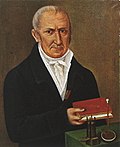Alessandro Volta: Difference between revisions
CSV import |
CSV import |
||
| Line 40: | Line 40: | ||
[[Category:1745 births]] | [[Category:1745 births]] | ||
[[Category:1827 deaths]] | [[Category:1827 deaths]] | ||
<gallery> | |||
File:Alessandro_Volta.jpeg|Portrait of Alessandro Volta | |||
File:VoltaBattery.JPG|Volta's Battery | |||
File:Voltaic_pile.svg|Diagram of a Voltaic Pile | |||
File:Painting_of_Volta_by_Bertini_(photo).jpeg|Painting of Volta by Bertini | |||
File:Aula_volta_pavia.jpg|Aula Volta in Pavia | |||
File:Cattedra_di_alessandro_Volta_museo_per_la_storia_dell'università_di_pavia.jpg|Chair of Alessandro Volta at the Museum for the History of the University of Pavia | |||
File:Volta_eerste_publicatie.gif|Volta's First Publication | |||
</gallery> | |||
Latest revision as of 11:17, 18 February 2025
Alessandro Volta[edit]

Alessandro Giuseppe Antonio Anastasio Volta (18 February 1745 – 5 March 1827) was an Italian physicist and chemist, known for his pioneering work in electricity and power. He is credited with the invention of the voltaic pile, the first chemical battery, which provided a continuous source of electric current.
Early Life and Education[edit]
Alessandro Volta was born in Como, in present-day Italy, to a noble family. From a young age, he showed a keen interest in the natural sciences. Volta was educated at the Jesuit school in Como and later attended the University of Pavia, where he studied physics and chemistry.
Career and Discoveries[edit]
Volta began his career as a professor of physics at the Royal School in Como in 1774. In 1775, he improved and popularized the electrophorus, a device that produced static electricity. His work on electricity led him to the discovery of methane in 1776, which he isolated and studied.
Invention of the Voltaic Pile[edit]

In 1800, Volta invented the voltaic pile, which was the first device to produce a steady electric current. The voltaic pile consisted of alternating discs of zinc and copper, separated by pieces of cardboard soaked in saltwater. This invention was a significant breakthrough in the study of electricity and laid the foundation for the development of electrochemistry.
Later Work and Honors[edit]
Volta's work earned him widespread recognition. In 1801, he was invited to Paris by Napoleon Bonaparte, who awarded him the title of Count and a gold medal for his discoveries. Volta continued his research and teaching at the University of Pavia, where he held the chair of experimental physics.
Legacy[edit]
Volta's contributions to science have had a lasting impact. The unit of electric potential, the volt, is named in his honor. His invention of the battery paved the way for the development of modern electrical devices and technologies.
Related Pages[edit]
Gallery[edit]
-
Diagram of a voltaic pile
-
Painting of Volta by Bertini
-
Aula Volta at the University of Pavia
-
Volta's chair at the University of Pavia
-
Volta's first publication
-
Portrait of Alessandro Volta
-
Volta's Battery
-
Diagram of a Voltaic Pile
-
Painting of Volta by Bertini
-
Aula Volta in Pavia
-
Chair of Alessandro Volta at the Museum for the History of the University of Pavia
-
Volta's First Publication






